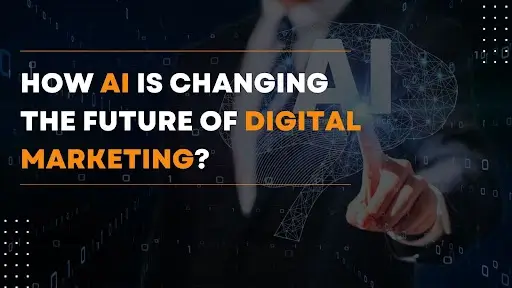
With the fast-paced world of online marketing, AI has been the game-changer and has transformed the way brands interact with customers and transformed marketing strategies in all industries. Having experienced how the online marketing landscape was altered in the last decade, I have seen AI grow from a testing role to a core component of effective marketing campaigns.
The AI Revolution in Digital Marketing
Do you recall when internet marketing was as simple as having a site and periodic e-mail broadcasts? That almost seems like ancient history these days. The internet marketing landscape has had seismic changes, and AI is the main force driving change.
Modern-day marketers are confronted with a complicated landscape in which attention is fragmented across dozens of channels, privacy policies are becoming more restrictive, and it is expected to deliver highly personalized experiences more than ever before. Amidst this difficult terrain, AI is not only a competitive edge but also a survival skill to remain relevant.
When I initially began working in marketing, we would take weeks digging through campaign metrics, making educated assumptions about consumer tastes, and tweaking ad placements ourselves. Now, AI systems do all of these things in real-time better and more insightfully than any human marketer could possibly do it themselves.
Key Areas Where AI is Transforming Digital Marketing
#1 Hyper-Personalization at Scale
The holy grail of the marketer has always been to show the right message to the right person at the right time. With AI, it was technologically feasible but humanly not feasible due to the absence of resources.
AI democratized personalization. Small companies can quickly implement advanced personalization techniques through AI-based solutions. These solutions browse through dozens of data points for each customer – from browse to buy to social media activity – and apply these data to personalize messaging, product offers, and content.
For example, a small store that takes a complete digital marketing course can take advantage of the same level of customization previously the preserve of large business corporations. Their site can change in real time to display different products based on the history of a visitor, and their mailshots can address audiences and tailor communications without human intervention.
The stats don’t lie: 6 times higher transaction rates are influenced by personalized email, and 80% of shoppers will buy from brands that offer personal experiences.
#2 Predictive Analytics and Consumer Insights
Traditional market research methods are being augmented (and in some instances, replaced) by predictive analytics using artificial intelligence. These algorithms identify patterns of consumer behavior that would be too difficult for people to recognize and predict future trends with eerie precision.
I recall being with a fashion retailer who were getting ready for seasonal inventory. They would normally rely on their buyers’ experience and past sales history. Having implemented an AI-driven analytics solution, they were able to identify some fascinating correlations between social media, weather, and shopper behavior. Armed with this information, they were able to predict demand for some products much more effectively, reducing excess stock and increasing sell-throughs.
For marketers of the new age, to have such insights would have meant tremendous experience and knowledge earlier. But today, through appropriate digital marketing training from a renowned digital marketing institute, professionals can leverage AI tools for having in-depth consumer insights from day one.
#3 Content and optimization creation
Content marketing became increasingly important, but it is not always easy to create good, useful content. AI is changing that as well.
Modern AI technologies can:
- – Develop content ideas from trending subjects and keywords
- – Create early drafts of certain types of content
- – Optimize headlines and content structure for maximum engagement
- – Translate text into other languages without its loss of nuance
- – Contrast current content performance and suggest improvements
But I firmly think that human emotional intelligence and creativity are still required. The perfect approach is complementary: using AI to perform repetitive content work while human marketers focus on strategy, brand voice, and emotional resonance.
A marketer with digital training can do so through the use of AI as an empowering force but not a human creativity substitute.
#4 Chatbot and Conversational Marketing
Remember how web chat technology was clunky and obtrusive? Nowadays conversational marketing is transformed by today’s chatbots and virtual assistants powered by AI.
Modern AI chatbots can:
- – To understand context and natural language
- – Provide individualized product recommendations
- – Answer complex product and service queries
- – Have multiple conversations at once
- – Enhance and learn from each interaction
One of my clients deployed an AI bot on their website and recorded a 30% increase in three months’ conversion rates. The bot was not only capable of answering product-related queries, suggesting other products to sell, and guiding customers through their checkout process – all of these were done by the bot with a conversational tone that had their brand voice.
Digital marketing practitioners who undergo a complete digital marketing course now realize not just how to use chatbots but also how to design conversational flows that actually form genuine relationships with customers.
#5 Programmatic Media Buying and Advertising
Programmatic ad purchasing – computerized, real-time purchasing and selling of advertising space – has been revolutionized by AI.
Historic media planning involved extensive negotiation, hand selling, and educated guessing on the audience being targeted. AI-based programmatic systems today:
- – Process billions of data points to determine the best ad location for each ad
- – Bid adjustments in milliseconds according to the probability of conversion
- – Periodic campaign optimizations according to performance
- – Guard against ad fraud by detecting fraudulent patterns
Be brand-safe by analyzing content context One of my mentored small business owners was skeptical of online marketing due to previous disappointing outcomes. Having undergone training in a digital marketing training center, she used an AI-driven programmatic campaign that achieved a 267% return on advertising spend – engaging only the most relevant audience with personalized messages at the optimal times.
Challenges and Ethical Issues
While the benefits of AI in digital marketing cannot be overlooked, we need to acknowledge and overcome some of the biggest challenges:
Privacy Concerns
Since more consumer data is being collected and analyzed by AI, privacy has been a legitimate issue. Marketers must balance respect for privacy and personalization with data collection and usage transparency and giving consumers meaningful control over their data.
Good digital marketing schools now offer thorough training in privacy regulations such as GDPR and CCPA, which lead new marketers through this delicate terrain responsibly.
The Black Box Problem
Most AI marketing platforms are “black boxes,” and their decisions are ones even their creators are unable to explain. This reduces accountability and leaves room for the possibility of bias.
As a director of marketing, I’ve always been a huge fan of explainable AI – algorithms that give transparent reasons why they’re making a particular recommendation. But transparency is not only important with customers but also with marketing teams that have to implement the decisions and the rationale behind them.
Skill Gaps and Adjustment
The quick evolution of AI has developed critical skill gaps within the marketing sector. Conventional marketing schooling lacks often in training professionals for an AI-centric environment.
It is because of this that expert training has become imperative. Excellent digital marketing training academy now encompasses practical knowledge with AI marketing software, data analysis, and technical expertise along with conventional marketing practices.
The Human Touch: Why AI Won’t be Replacing Marketers
And yet in spite of all these new technologies today, I still strongly believe that human marketers are more valuable today than ever. Why?
Emotional Intelligence
AI excels at pattern recognition and data analysis but not emotional intelligence. Human marketers know cultural sensitivities, emotional triggers, and brand narratives that AI does not.
When I collaborate with brands on messaging strategy, we get to know the emotional journey of their customers pretty well – which takes human lived experience and empathy.
Ethical Decision-Making
As marketing technologies get more powerful, ethical thinking becomes more critical. Human marketers need to act as ethical stewards, making sure that AI systems are being used responsibly and in ways that are good for businesses and consumers alike.
Strategic Thinking
AI is great at tactical optimization but terrible at strategic thinking at scale. Human marketers bring the vision and creative guidance that lead AI tools to significant business results.
Preparing for the Marketing Age of AI
For those who want to succeed in this new bold world, learning is essential. My suggestions based on decades of helping marketing managers keep up with the pace of technology change are as follows:
#1 Invest in Whole Education
Seek a digital marketing course that teaches the basics of AI and its sophisticated applications. Seek courses that teach experiential learning with the tools and platforms offered and not lectures.
#2 Create T-Shaped Capabilities
Good marketers are “T-shaped” – they have deep knowledge in one area of study (the vertical side of T) and broad knowledge in areas (the horizontal side). That allows you to do knowledge work in multiple areas and create new value in your work.
#3 Have a Growth Mindset
The pace at which marketing tools are changing continues to get faster. Only individuals who are drawn to new techniques and tools, not threatened by them, will be successful. Remember that each new AI breakthrough offers an opportunity to produce more effective outputs for your company or customers.
#4 Focus on Strategic Skills
As increasingly more of the tactical aspects of marketing are outsourced to AI, focus on developing skills no machine can: creativity, strategy, emotional intelligence, ethical decision-making, and cross-functional leadership.
#5 Real-Life Success Stories
I’ve witnessed amazing transformations over the years when marketers are able to implement AI. Here are a few instances:
The Local Business That Competed With Giants
One of the local bookstore customers was having a hard time keeping up with giant online retailers. The owner finished advanced digital marketing courses and then added an AI-driven recommendation engine to their website and targeted email promotions.
The payoff was incredible: online sales rose 43% year over year, and their email open rates jumped from 18% to 32%. By merging AI personalization with their local knowledge and human touch, they developed an experience big-box stores couldn’t match.
The Content Team That Doubled Productivity
A B2B software firm’s content team was not able to produce enough quality content to support their marketing. They completely revamped their process after experimenting with AI content tools and training at a digital marketing academy.
AI tools currently perform content research, outlining, and first drafts, and human writers handle the insight, personality, and technical accuracy. They doubled their content and still maintained quality, and that resulted in a 78% increase in organic traffic in six months.
The Agency That Redefined Its Service Model
A conventional marketing firm was losing customers to more technologically advanced competitors. Rather than seeing AI as a threat, they welcomed it, taking their entire staff through extensive digital marketing training.
They shifted their services around AI, having technology perform the data analysis and campaign optimization and having their people work on strategy and creative direction. In 18 months, they regained the clients they had lost and increased revenue by 35%.
Conclusion: The Symbiotic Future of AI and Human Marketers
In the coming years, digital marketing will be responsible for a collaboration of large scale between human marketers and AI. AI will handle complex data analysis and strategic execution, whereas marketers will focus on what they are best at—understanding emotions, crafting compelling stories, and coming up with creative strategies. Rather than replacing human creativity, AI will enhance it, enabling marketers to connect with people in a more meaningful and effective way.
The marketers who will succeed in this new world are neither those who resist technological change nor those who blindly rush into automation at the expense of human touch. The victory will be that of those who understand how to use AI as a force multiplier, augmenting their individual human capabilities rather than substituting them.
For marketers of today and for new professionals, this is a once-in-a-lifetime opportunity. By writing the right combination of technical expertise, strategic thinking, and creativity, you can position yourself at the forefront of the most thrilling marketing revolution in history.
Whether you are an experienced marketer or a newbie, an investment in quality training from a credible digital marketing institute is the step in the direction of excelling in this new world. The future is for those who can leverage the potential of AI but with distinctly human intuition to the mix.






